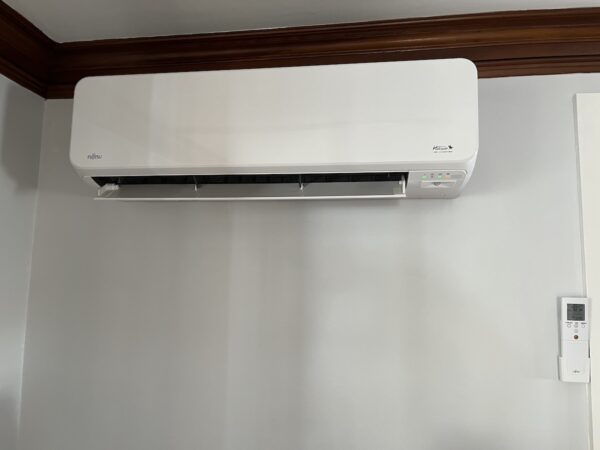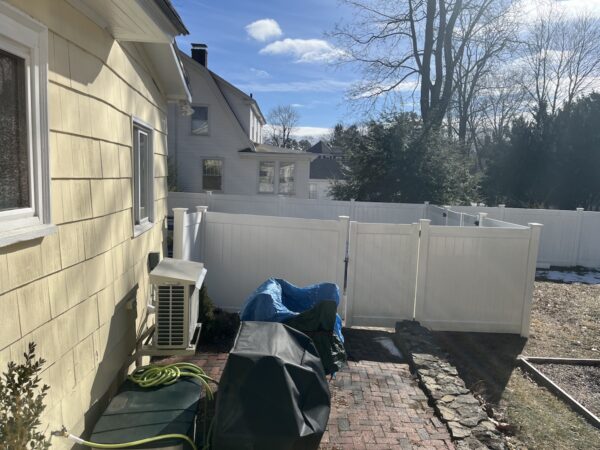When the Inflation Reduction Act passed in 2022, I knew that it offered all Americans the ability to make energy-efficient improvements to their homes and receive tax credits for it. However, it wasn’t until I got a postcard in the mail from Efficiency Maine that I remembered those tax credits are out there for Mainers.
Honestly, since it was two years since the Act became a law, I figured it was too late to get any benefit from it. I couldn’t have been more wrong.

Energy Tax Credits for Mainers
Currently, there are financial incentives for making energy-efficient improvements to your home. These are on the state and federal level. Let me explain the categories first.
Maine Energy Efficiency Incentives
Mainers who qualify for these incentives for making your home more energy efficient fall into three categories:
- Low income
- Moderate income
- Everyone else
There are a couple of ways that Maine determines where you fall in the first two income-specific categories. Let me explain.
Low-income qualifications
To qualify for the low-income incentives — which in some instances include home improvements at no cost to you — one member of your household must participate in one of the following programs:
- Home Energy Assistance Program (HEAP), which means you receive fuel-assistance benefits from MaineHousing
- Supplemental Nutrition Assistance Program (SNAP) for food assistance (Here are grocery stores that accept SNAP EBT)
- Temporary Assistance for Needy Families (TANF) for cash assistance
- MaineCare for medical insurance coverage
Moderate-income qualifications
For those who might qualify for energy tax credits as a moderate-income household, the criteria is more straightforward. That is, it is based on your household income.
You must fall into one of these two categories:
- Adjusted gross income up to $70,000 for an individual filing as single, head of household or married filing separately
- An adjusted gross income up to $100,000 if you’re married filing jointly or are an individual filing as a qualifying widower (i.e. your spouse recently died)
Everyone else
Don’t fit any of the criteria above? Then you don’t qualify for any income-based tax credits.
How these energy tax credits work in real life

Maine, in particular, is at the forefront of advocating for energy efficiency under its climate action plans. By participating in such programs, you’re not only investing in the sustainability of your home but also supporting statewide efforts to improve energy consumption patterns. The Federally Funded Maine Home Energy Rebate Program, following the Inflation Reduction Act, is one such initiative providing financial incentives for home energy efficiency and electrification projects.
Upgrading to an energy-efficient heating system, insulating your attic, or installing energy-saving windows could all potentially qualify you for these benefits. With an end goal of having thousands of homes and businesses in Maine weatherized by 2030, tapping into these credits is a sensible way to cut down on your expenses while also supporting a cleaner, more sustainable state. It’s a win-win, reducing your carbon footprint while keeping your hard-earned money in your pocket a little longer.
Our experience installing heat pumps
When we purchased our home in Kennebunk in 2020, we had to install heat pumps. That’s because the previous owners had replumbed the home for baseboard heating and opted not to add it to the upstairs. They said that it gets warm enough downstairs in the winter that, if you left the bedroom doors upstairs open, you would be fine.
I’ll never understand their logic on this decision after shivering through our first December night sleeping in the house. We definitely needed a heat source upstairs. We’d had heat pumps — which we called mini splits — in another home, we knew this was the way to go.
Anyway, we had those installations done, that was long before the Inflation Reduction Act was even a germ of an idea. However, I wish it had been one of the Maine energy tax credits and rebates that exists now for installing a whole-house heat pump system.
Yes, there are tax credits for installing room-specific heat pumps as well. However, they’re not nearly as generous as the whole house incentives. Also, the whole-house system qualifies for state and federal tax credits. Room specific ones? Just the federal tax credit and that’s for 30% of the project cost or a max of $2,000.
Qualifying Home Improvements and Equipment
When you make energy-efficient upgrades to your Maine home, you could benefit from various tax credits. Ensuring you choose qualifying products is crucial for maximizing your savings. Here’s what to look for:
Insulation, Doors, and Windows
Insulation plays a key role in maintaining your home’s temperature. When you install new or improved insulation, it can help keep your home warm in the winter and cool in the summer, reducing your energy bills. Similarly, energy-efficient doors and windows can prevent heat loss and may qualify for tax credits. This includes certain types of double-paned windows and properly insulated doors and skylights.
- Insulation: Look for higher R-values which indicate greater resistance to heat flow.
- Windows and Doors: Must meet ENERGY STAR ratings.
Heating, Cooling, and Water Heating Systems
For heating and cooling, installing a heat pump that serves both functions efficiently could be a smart move. Heat pumps are known for their efficiency and can qualify for tax credits. The same goes for heat pump water heaters, electric or natural gas heat pump water heaters, and certain furnaces and boilers that meet specific energy efficiency criteria. Always check for ENERGY STAR certification or consult with a professional to ensure eligibility.
- Heat Pumps: Both for general heating and specialized water heating, seek out ENERGY STAR-rated heat pumps.
- Furnaces and Boilers: Ensure they are rated for high efficiency and meet tax credit requirements.
Renewable Energy Installations
Shifting to renewable energy sources like solar panels is not only good for the environment, but it can also bring you tax benefits. Installation of systems like solar panels, biomass stoves, and geothermal heat pumps could qualify for credits. Look for products that come with a certification for energy efficiency to ensure they meet the guidelines for tax credits.
- Biomass Stoves: Must have a thermal efficiency rating of at least 75%.
- Solar Energy Systems: Includes solar water heaters and photovoltaic systems.
Maximizing Benefits from the Inflation Reduction Act
As a Maine homeowner looking to enhance your home’s energy efficiency, tapping into the benefits offered by the Inflation Reduction Act of 2022 can provide substantial savings. Understanding the available tax credits and rebates is crucial to maximizing your benefits.
Energy Efficiency Home Improvement Credit
If you’re making qualified energy efficiency improvements, the Energy Efficient Home Improvement Credit can save you money. These improvements cover a range of installations from insulation to high-efficiency heating and cooling systems. For each type of improvement, there’s a maximum credit that you can claim. As of the information available, you can receive a tax credit for 30% of your total costs, up to a capped limit of $1,200 annually for certain improvements. For example:
- Windows and skylights: 30% of cost, up to $600
- Exterior doors: 30% of cost, up to $250 per door, with a $500 maximum for all door improvements
- Home energy audits: A one-time credit of up to $150
Residential Clean Energy Property Credit
For renewable energy investments, the Residential Clean Energy Property Credit could offer substantial benefits. This credit applies to qualified expenses for systems like solar panels, geothermal heat pumps, and small wind turbines. Unlike the home improvements credit, renewable energy credits are more generous:
- Solar energy systems: 30% of the installation costs with no upper limit through 2032
- Geothermal heat pumps: 30% of the installation costs with no upper limit
These improvements not only reduce your energy bills but also increase your home’s value. Do note that these tax credits are nonrefundable, meaning they can reduce your tax liability to zero but won’t result in a refund. Plan your installations strategically; you may roll over any unused portion of the credit to the next tax year.
Installing energy-efficient systems and leveraging these credits requires upfront investment, but the long-term savings and environmental benefits can be significant. Always ensure you keep detailed records of all qualified energy efficiency improvements for when you file your taxes. For the latest information on allowable annual credit caps and how you can apply, consult the IRS guidelines or speak with a tax professional familiar with Maine’s specific provisions.
Applying for Maine Energy Tax Credits
When you’re ready to apply for energy tax credits in Maine for your home improvements, it’s important to understand the process and have the correct documents at hand. Maine offers various programs to help you save money while enhancing your home’s energy efficiency.
Filing Procedures and Documentation
To claim your Energy Efficient Home Improvement Credit, you’ll need to fill out IRS Form 5695 with your tax return. Start by gathering invoices, receipts, and the Manufacturer’s Certification Statement for each qualifying product or service. It’s essential to keep these documents; they serve as proof that the improvements meet the energy efficiency standards required for the credit.
If you’ve conducted an energy audit or assessments through organizations like Efficiency Maine or MaineHousing, those written reports can be extremely helpful. They often suggest specific improvements that will qualify for the credits. Additionally, reach out to the Maine Governor’s Energy Office or review the relevant parts of IRS Publication 5886-A for information tailored to the state’s incentives.
Remember to know your Employer Identification Number (EIN) if applicable, as some forms may require it.
Utilities and Resources in Maine
Efficiency Maine is your go-to resource for understanding the energy efficiency improvement rebates and credits available to you. They offer expertise and assistance that can help you navigate the application process. Also, Maine’s Governor’s Energy Office can provide valuable information on state-specific initiatives and answer questions you might have about eligibility or procedures.
Be sure to schedule an inspection or obtain a professional assessment of your home improvements. Sometimes, incentives or credits require a certified inspection to verify the energy efficiency. Ultimately, these entities aim to support you in creating a more energy-efficient home while taking advantage of financial incentives that come from doing good for the environment and your wallet.
Free and Cheap Things To Do in Southern Maine This Week
Here are FREE and cheap things to do in Southern Maine in the coming week.
I love how the hippies in augusta want to electrify everything, and sabatoge the electric grid at the same time.
Yes pretending solar and wind work will destabilize the grid and double all costs.